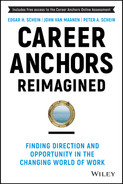5
The Career Interview
Dr. Seuss:
“All Alone?
Whether you like it or not,
Alone will be something
You'll be quite a lot.”
We can almost hear Dr. Seuss saying, “Except when you are not.” The career interview, whether conducted with a friend or partner or with yourself and a recording device, helps you to move beyond that feeling of being alone. It helps to be heard, as you describe your job history.
As noted, the best way to get useful insights into your own career anchor issues is to review that work history before you take the online survey. This chapter will lead you through a formal way of collecting this information about yourself.
Learning from Your Career Story
This interview is an important exercise in developing a personal narrative, an individual story, of your career to date. It may take a few hours, and those who have done this exercise invariably report learning a lot about themselves as a result.
While it is not required that you do this with another person, it can be very useful to explain your journey, to make your story clear, to a friend or partner. As you go through the questions below, your partner can play the active role of interviewer. Alternatively, the partner can be the active listener to you, reinforcing your explanation of the career journey by following along and interjecting questions for clarification.
The purpose of this interview phase is to understand the through‐line, to highlight when and where you opted one way or another. A partner can help you in this process, with one caveat—the partner cannot be the one shaping the story. The greatest risk is that the partner's interpretation becomes your story. Any partner in this process should be helping you recall and not coaching you on what it means.
If it is not possible to go through this process with another person, consider simulating this dialogue process with a computer or smart phone. One approach that we favor is using the dictation and transcription features on a current PC, Mac, or IOS or Android device. Using a “Voice Note,” or “record and transcribe” app, your device can act as a partner, “listening” and transcribing what you say. In our experience, this will force you to be more complete, honest, and open about your career journey. Simply thinking about it will not force you to articulate it. So transcribe and, in any case, take notes and make connections to your sense of which anchors resonated and resonate with you.
The transcription is the reward for carefully articulating your story and will in turn reengage you with your journey. Is the transcription correct? Did I leave anything out? Does seeing it written out in this way help me see any patterns?
Whether with a partner interviewing or an app transcribing, your goal is to gain insight, perhaps even clarity, on where you have been with your career. You may also see patterns that suggest future directions. Still, the primary goal of this “interview” phase is to fully capture the past, before you get ahead of yourself into the future.
Questions for the “Interview”
Education
- Did you go to college (two year or four year)?
- If not, did you seek alternative training after high school?
- If you went to college, how and why did you select it?
- What did you major and minor in? Why?
- Did you go to graduate school? Where and why?
- What was your concentration in graduate school? Why?
First Job
- What was your first “real” job after college or post‐secondary school training?
- Did you have long‐range goals at that time that this job helped establish?
- Was your first job a net positive or net negative in your early career journey, and why?
- Were there any strongly memorable lessons you could take out of your first job experience?
The Next Job
- When and why did you make your first job or career change?
- Did you leave a job (or bad boss) or did you seek something different?
- How did this move work out?
- Did this move help clarify career aspirations? How, or why not?
And Then What?
- When and why did the next job change happen?
- Were there any other life events that played a role in the job change?
Review Each Job Change until the Present
Turning points or transitions? Look at the long arc (or recent arc depending on your career stage).
- Did you experience any major turning points?
- Do you perceive these moments differently now than you did then?
- Can you describe career high points so far? Low points?
- Do you think your career aspirations or goals have changed in response to these highs or low?
- Has your vision for an ideal career changed?
- Do you have a final career goal or ultimate job you are working toward?
Perceptions of You at Work
- In describing yourself to others, personally or in interviews, how do you characterize your strengths and passions?
- Can you easily articulate your major competencies? What are they?
- Do you have what could be described as “core values” that guide your work decisions?
- How do you think others might describe your career arc? Would they get it right?
- What patterns do you see that would clarify any misconceptions of your career arc?
As you reviewed your job history did any of your leanings and preferences really stand out, and would the anchors help you understand these preferences? Did you evolve any of your thoughts about which anchors seemed to fit you most and least? What turning points came up in the job history? Lastly, were there any surprises for you as you reviewed your job history?
